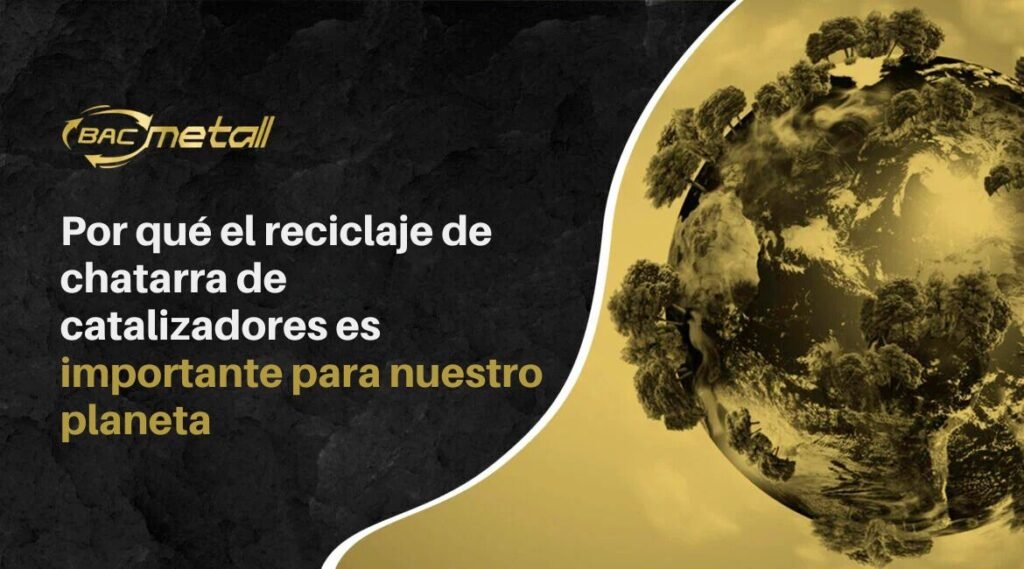Why scrap catalytic converter recycling matters to our planet
Catalytic converter recycling is a process that benefits the environment greatly.
However, the positive impact it has on the planet is often overlooked during discussions about the industry because the primary objective for the seller is often to earn money.
Conversations are usually centered around the fluctuations in price of the precious metals involved; platinum, palladium, and rhodium.
So with that in mind we created this article to shed some much needed light on the positive impact the catalyst recycling process has on the environment, and what you can do to contribute.
Why is it important to recycle catalytic converters?
During the 20th century pollution from the automotive industry grew at an alarming rate, with vehicle emissions becoming cause for worldwide concern and contributing to global warming.
The catalytic converter was invented around 1950 by Eugène Houdry to scale back the environmental impact of toxic gases emitted from cars such as nitrogen oxide and carbon monoxide gas.
By the 1970s it was mandatory for car manufacturers to include catalytic converters in the development of all new road vehicles. This requirement soon spread across the world as governments, academics, manufactures, etc began to understand the harmful effects of such gases on the environment.
This increasing ecological concern for the wellbeing of our planet has led to some of the highest long-term growth rates of mineral commodities in recent years.
Catalytic converters contain a number of precious metals including copper, nickel, cerium, iron manganese – and most importantly – rhodium, platinum and palladium (platinum-group metals).
This means that once they’re worn down and need replacing, these catalytic converters can be recycled in order to extract the precious metals that reside within them, therefore reducing the need to extract new materials from the earth.
Mining for PGMs
The mining process for extracting new platinum-group metals (PGMs) from the earth is expensive, highly complex and requires significant energy.
It is labour intensive and requires a huge amount of ore in its production while recycling existing materials found in used catalytic converters uses a lot less energy and protects the environment.
The mining process for PGMs includes:
- The extensive mining process itself
- Grinding
- Gravity-based separations
- Flotation
- Smelter
- Refinery
This lengthy and exhaustive process requires a lot of energy, creates large-scale pollution, emits greenhouse gasses and has significant impact on the land around it.
Since these resources are finite and constantly depleting with every new discovery, we have two options:
- continue mining at an unsustainable rate until we deplete all known resources
- or upscale precious metal refinery techniques to reuse the metals found in things like scrap catalytic converters
As natural resources deplete and mines get deeper, extraction becomes even more costly and the pressure on labourers increases. This all contributes to more fresh air needing to be pumped down into the mines to cool down the pit. This requires a huge amount of energy.
When we’re able to recover the PGM’s from scrap catalytic converters, we generate a sustainable supply of the most valuable parts of the converters. Redeploying these materials back into the economy helps to protect the environment from further mining.
The benefits of recycling catalytic converters
In recent years technology has improved to the point that we can now achieve a platinum group metal recovery rate of over 95%.
This is largely due to the improvement of refining facilities like Bacmetall’s.
The three main benefits of recycling scrap catalytic converters are:
The preservation of finite resources
Reusing recycled components lowers the burden of extracting new materials from the earth through the exhaustive mining process.
A reduction in waste sent to landfills
Converters that are no longer used usually end up in landfills. Recycling catalytic converters prevents these components from taking up landfill space and breaking down into tiny particles that can get into and pollute water sources.
Customers can earn an income by selling scrap catalytic converters
The precious metals found in catalytic converters make them valuable assets that can provide a high return on investment. Each converter has a different quantity and grade of material, which we analyse carefully before making our customers an offer.
Conclusion
Catalytic recycling is a process that helps to save the environment from further strain by extracting platinum-group metals that can be used over and over again.
This lowers the need to mine for new materials and keeps valuable resources in a closed-loop economy.
Not only does this recycling process protect our planet, but it’s also a great way to earn extra income.

